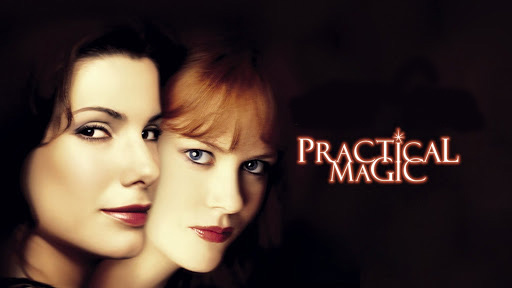Practical Magic is a beloved, if cursed movie. Twenty years after its release, the generation that grew up with it on VHS and cable has turned it into something of a cult (or coven) classic, adored by those who aspire to a witchy aesthetic as well as actual witches.
Practical Magic is a movie about curses that invites a queer reading: any man who loves an Owens woman, the family of witches in the film, is doomed to die. The curse grew out of the despair of foremother Maria Owens, exiled to an island from Puritan-era Massachusetts after her magic thwarted the townspeople’s attempt to hang her for witchcraft. Pregnant by her married lover, she cast a spell that ensured she would never again love a man. Decades later, the spell fates Owens women to early (but stylish) widowhood.
Videos by VICE
The curse was intended to save the women from male violence. But like all oaths sworn by the broken-hearted, it was unknowingly cast in bad faith, leaving generation after generation of Owens women falling for men only to be swiftly widowed. Maria’s curse, then, dooms her descendants to the pitfalls of heterosexuality even as it spares them from a lifetime of living with men. It’s a curse as much as it is a protection spell.
In an early scene of the film, the young Owens sisters, Sally (Sandra Bullock) and Gillian (Nicole Kidman), watch their two aunts receive a distraught woman in the dead of night who needs a spell to make her beloved want her “so bad he can’t stand it.” She has to pierce a bird in the heart to seal it, perpetuating the cycle of violence heterosexuality seems to require. The two sisters each read the scene differently: Gillian, drawn to the drama of the woman’s shortsighted desire, exclaims that she can’t wait to fall in love, while Sally, alarmed by the spell’s blood cost, hopes she never falls in love. She makes the curious choice to cast a spell listing the fantasy attributes of an “impossible” man, and, like most straight women, Sally sets the bar very low: he must flip pancakes, whistle, and be kind. “The guy I dreamed up doesn’t exist,” she explains to her sister, “And if he doesn’t exist, I’ll never die of a broken heart.”
Sally’s ambivalence is telling; even as a child, she knows the stars must align in order for her to fall in love. And yet, her spell is an expression of desire. Some part of her wants love—she just doesn’t want it to be with a man. Indeed, it takes her aunts’ spellwork for her to fall in love with one: a nice, safe, doomed, Good Guy, a father of daughters.
Why do the aunts care if she falls in love? The same reason anyone’s family prods them towards heterosexual life choices: procreation. The curse appears to set in just after an Owens woman has time to bear two daughters, a new version of herself and her sister, one sensible brunette and one wild redhead. How else would the curse live on for another generation? The curse isn’t just that any man an Owens woman loves will die. The curse is that Owens women will love men, period.

It’s worth asking whether any Owens woman has ever fallen in love with a woman, and what would happen to the curse if she did. Owens women are not fated to become wives so much as aunts. Sally and Gilly have two aunts, neither of whom, we assume, have borne children, and only one of whom, we assume, has loved a man—the “poor Ethan” of brunette Aunt Frances (Stockard Channing). Aunt Jet (Dianne Wiest) does not believe in the curse, and my gay heart longs to extrapolate that she is not, in fact, a blood aunt, but an “aunt” in the sense of two older women who have lived together in a gorgeous Victorian with an elaborate garden who occasionally go out of town for full moon rituals. Maybe they are “sisters” in the way the catcaller thinks my opposite-haired same-sex lover is my sister when we walk hand in hand on the street. In other words, Harold, they’re lesbians.
And Sally? Sally pings. She wants desperately to be normal but knows she is not. She hates being left behind when her sister runs off with a boyfriend. Her name is even a mild slur for “gay.” And of course, as her fellow witch friend says when she finally admits that she’s a witch, “Sally just came out.” After her husband dies, she writes to her sister, “I just want someone to love me. I want to be seen…I don’t want to believe it, but there is no man, Gilly. Only that moon.” She intuited this as a child. No matter how she struggles against it, her dream man does not exist because she does not want a man at all—she simply wants love.
More than witchcraft, what makes the Owens women different from the other townswomen is that Owens heterosexuality has an escape clause—which is perhaps why the townswomen envy them. It takes the relatable threat of male violence to forge solidarity between the sisters and the townswomen, who never attempted to hide their dislike of the Owens sisters. As one of the phone tree moms gabs to the next mom on the list, “Sally’s sister just got out of a bad relationship and her ex will not leave her alone.” Say no more—the non-believing townswomen will show up to support a woman in danger, brooms in tow.
As is often the case in feminist horror, the supernatural element isn’t a far cry from the dangerous reality men pose. It strikes me, then, that the Owens “curse” that harms the men who love them poses the same danger that can await anyone daring or foolish enough to love men. The curse operates similarly to the pagan Rule of Three (whatever energy a person brings into the world will be returned to them threefold) by boomeranging male violence back to its creator. Jimmy (Goran Visnjic), Gillian’s abusive ex, is dispensed with three times in the film: accidentally poisoned with belladonna, purposefully hit over the head, exorcised. It is his final banishing, brought on by the sisters’ mingled blood and locked hands, that breaks the family curse.
The film’s happy ending ostensibly belongs to Sally. She falls in love with a detective, a man who promises safety but threatens the sisters’ bond and secret. She resists him at first, unsure whether she is drawn to him out of love or out of powers that are larger than her. Compulsory heterosexuality, for instance. Is it the work of magic, loving this man, or is it false consciousness? As a child, Sally was canny enough to realize that love can be coercive, and to fear that power. Who better to embody compulsory heterosexuality than an officer of the law, and who better to represent a heightened risk factor for domestic violence?
The curse has no power, Officer Gary (Aidan Quinn) points out, because he doesn’t believe in it. What he does believes in: the power of the law, his officer’s badge, his free will. The end of the film sees him magically reappear to get the girl, curse be damned. Gillian laughs with delight at Sally’s new love, a clump of turnips in her hand. (She’s gone green witch—turnips help end bad relationships.) In garden gear by the end of film, Gillian has become an aunt in training. Maybe she’ll go full “aunt” and ask that one of the blonde moms out for a poolside dance.
For More Stories Like This, Sign Up for Our Newsletter
Practical Magic begs to be seen through queer clairvoyance, the art of noticing what prefers to go invisible except for its chosen audience (other examples in this canon include Oceans 8 and Jennifer’s Body). It’s not the witchcraft that makes the film seem so lesbian; no matter how many times I would die for the hair and the outfits in The Witches of Eastwick, for example, it’s an irredeemably heterosexual film. Practical Magic knows that simply having women in proximity to each other does not lesbianism make. It’s the glimmers of possibility of another way for women to relate to each other that hint at a queerness it cannot yet realize.
The occult suggests a knowledge not everyone possesses, shared through devotion to mystery. It’s not for everyone. Queer women know things that a straight woman might not, like that being a witch is an actual practice and not just a metaphor for being a strong woman, or that there are more ways for women to love each other outside of sisterhood.
Queer women love Practical Magic for its queer potential breaking through a sad reality: that heterosexuality is a curse.




